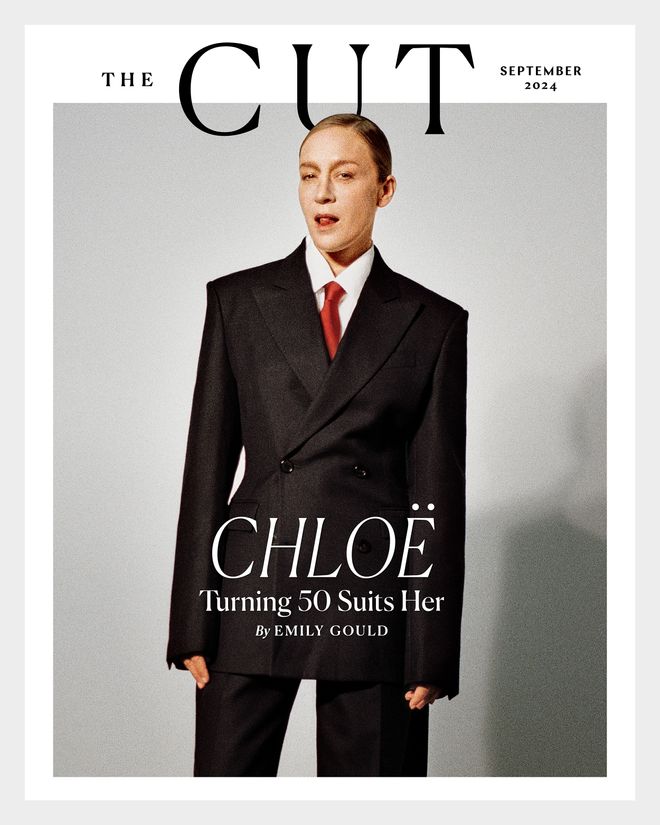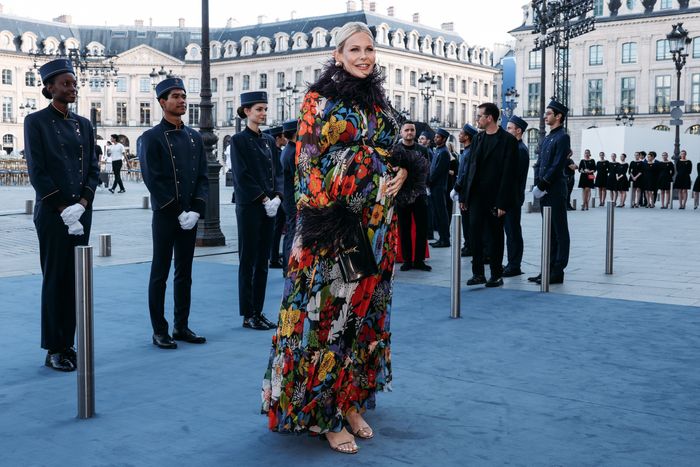Fashion
The Pampered Life of a Fashion Supershopper
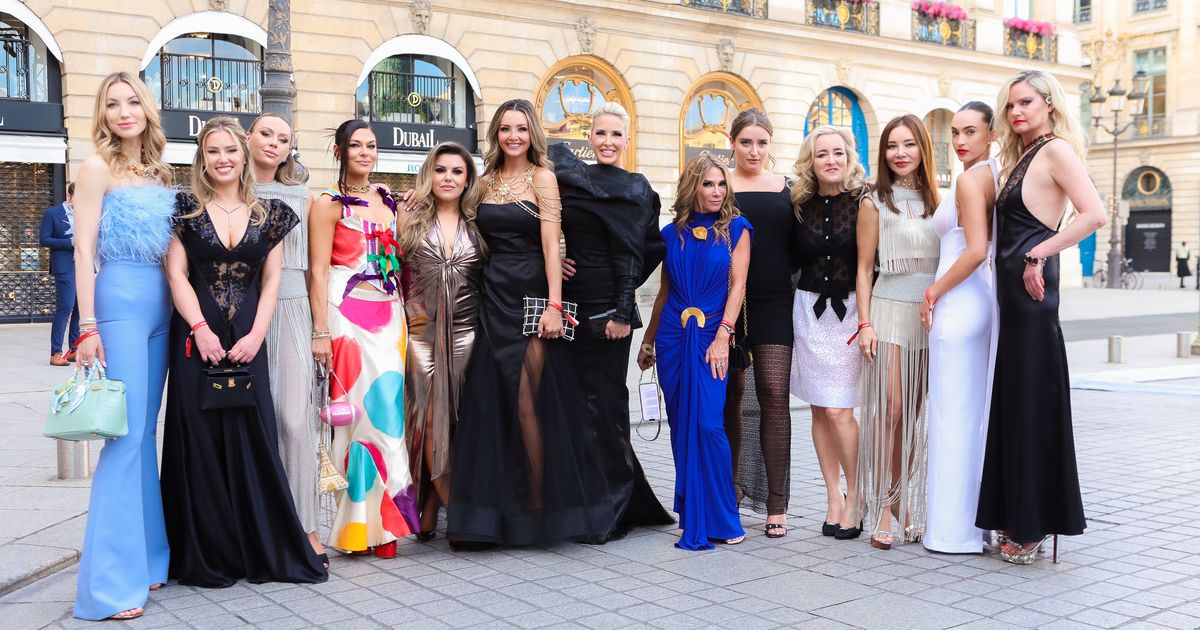
VICs and their fashionista friends at Vogue World’s preshow cocktail party at Casa Del Sol in Paris in June 2024. From left: Elena Silenok, Megan Blase, Hayley Sullivan, Sabrina Harrison, Meagan Eby, Holly Julian, Jenny Chandler, Lisa Sher-Chambers, Meghan Beswick, Dawn Beswick, Fumi Lee, Chanel Stewart, and Abbie McLaughlin.
Photo: Hippolyte Petit/BFA.com/Hippolyte Petit/BFA.com
It was just a few weeks before Chanel’s haute couture runway show in Paris this past June when Laura Sachs found out that she had made the guest list. For a true fashion aficionado like Sachs, who lives in Palm Beach, landing an invitation to Chanel couture is like finding one of Willy Wonka’s Golden Tickets — except this ticket didn’t come her way by luck, not exactly. Sachs is what is known by the fashion brands as a VIC: a “very important client.” She gets recognized and rewarded for her loyalty, which keeps her coming back for more. After all, “seeing something walk the runway, and then having it in my closet, is, like, the ultimate high,” she says.
Sachs is a Chanel girl through and through. She celebrated the births of her two daughters by wearing a new pink Chanel jacket on each trip home from the hospital. She plans to do the same with her third daughter, who was due at the end of August. When the girls are older, each birthday jacket will be theirs.
Chanel welcomed Sachs to Paris with a bouquet of flowers in her suite at the Ritz, the same elegant hotel where Coco Chanel lived. (Her atelier, right across the street at 31 Rue Cambon, is where couture customers get to shop to this day.) She sat next to Pharrell Williams for dinner at the hotel one evening. Another night, she wore a floral caftan trimmed with ostrich feathers from Saint Laurent’s spring 2021 collection to see Aya Nakamura and Bad Bunny perform at Vogue World, Anna Wintour’s annual runway variety show. Sachs is also a member of the Vogue100, an invitation-only sorority of fashion enthusiasts who are almost certainly multi-label VICs. Its events give members a taste of the fashion-editor lifestyle, a chance to be insiders in a once completely closed world.
The highlight of the trip for Sachs was the Chanel show at the Palais Garnier opera house. Chanel doesn’t have a maternity line, of course, but she made a look work for her bump, wearing a matching soft-pink striped skirt and tank top paired with gold earrings, a white mini Flap Bag, and white mary-jane canvas flats embossed with the interlocking Chanel C ’s.
Such is the charmed life of some of fashion’s most dedicated luxury shoppers. Today, the top 2 percent of customers generate more than 40 percent of sales for brands like Chanel, Hermès, and Louis Vuitton. In an effort to keep them happy and dependably spending in the face of an unsteady global luxury market, these storied fashion houses have turned into hospitality machines. They’re staging previously unnecessary runway shows, often in White Lotus–esque destinations, and using any launch as an opportunity to woo clients at the most rarefied hotels and the most exclusive dinners, preferably seated near Cate Blanchett. It’s a meticulously curated five-star fashion fantasy with its own rituals, etiquette, and hierarchies — but only as long as the spend is there.
“There’s new ways to cultivate clients, more money being spent on clients, more clients spending more money,” says Amy Fine Collins, a writer who has covered fashion, art, and high society for 30 years. “And no one has a problem with it being transactional.”
This past summer alone, the fashion schedule was stacked with client-stocked events: Max Mara’s outdoor dinner in the grand courtyard of the 14th-century Doge’s Palace in Venice, Chopard’s tables at the glitzy AMFAR gala at the Hôtel du Cap-Eden-Roc during the Cannes Film Festival, Saint Laurent’s mini-holiday in private villas in St.-Tropez, Cartier’s masquerade ball at the Belvedere Palace in Vienna, Dolce & Gabbana’s seaside Christina Aguilera concert in Sardinia, and Gucci’s poolside cocktail party at the Chateau Marmont with Miley Cyrus. And then there was Paris with its elaborate runway shows, lunches at Hôtel Costes, and dinners at Lapérouse. Each trip includes lavish accommodations, access to private museum tours or other tourist hot spots, limited-edition welcome gifts, and sometimes even a personal photo shoot to commemorate the experience.
These trips reward the most reliably profligate customers — no matter how humdrum the sources of their fortunes are — by making them feel like celebrities and ensuring they always have another reason to get dressed up in the latest collections. It’s a kind of concierge seduction designed for a class of very-catered-to people who might consider an hour spent at JFK’s Delta One Lounge as roughing it.
The clients’ favorite sales associates are usually with them at every step, enabling their activities and finessing away the dreary troubles of day-to-day life, whether they’re rescuing luggage stuck in Customs or organizing a diversion for a client’s fussy young daughter. “We want them to have the best time ever,” says one sales associate of a major European luxury brand. “And they usually do.”
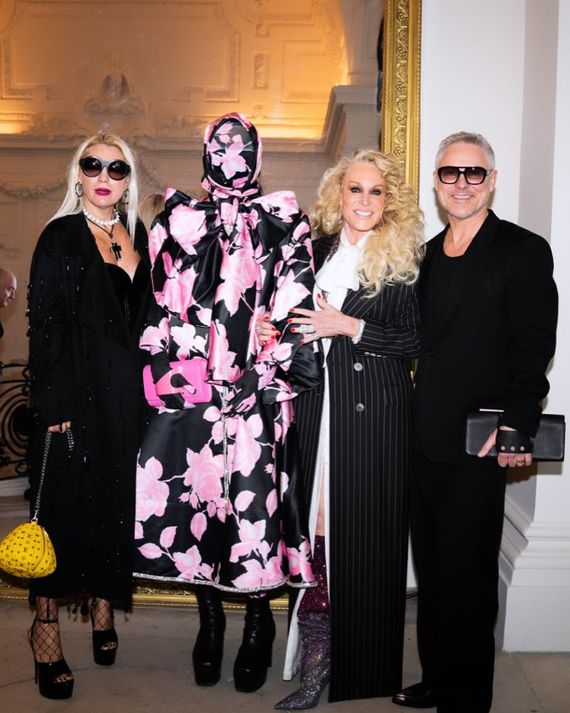
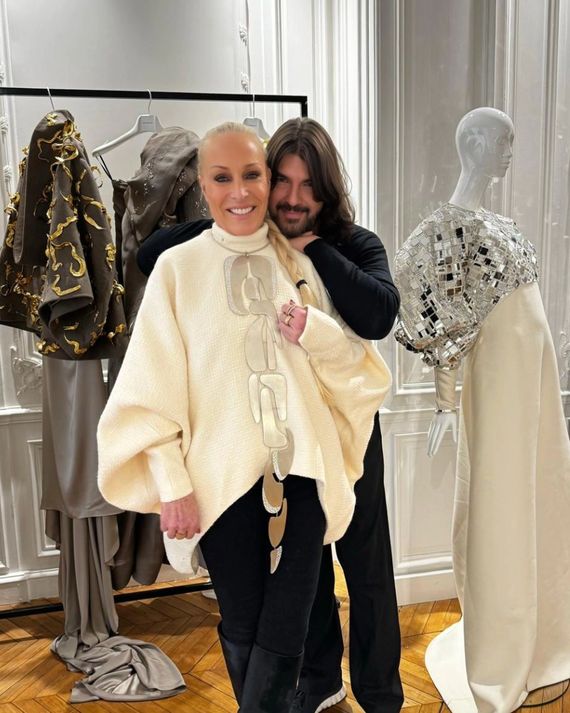
VIC Suzanne Saperstein with friends at the Jean Paul Gaultier haute couture show at Paris Fashion Week in January 2024 … With Stéphane Rolland in Paris in February 2024 … .
VIC Suzanne Saperstein with friends at the Jean Paul Gaultier haute couture show at Paris Fashion Week in January 2024 … With Stéphane Rolland in Pari…
VIC Suzanne Saperstein with friends at the Jean Paul Gaultier haute couture show at Paris Fashion Week in January 2024 … With Stéphane Rolland in Paris in February 2024 … .
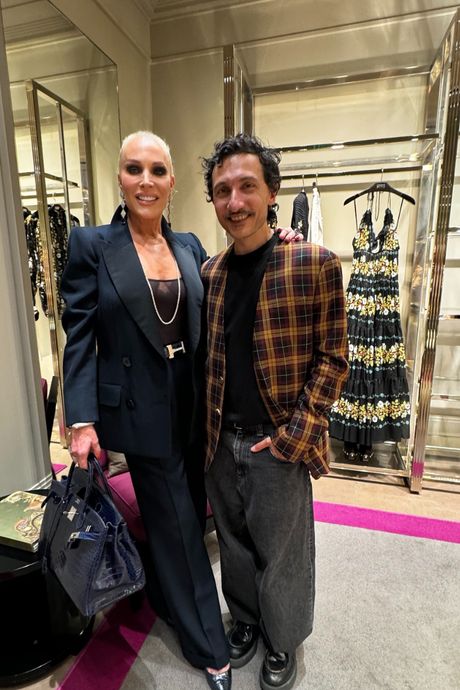
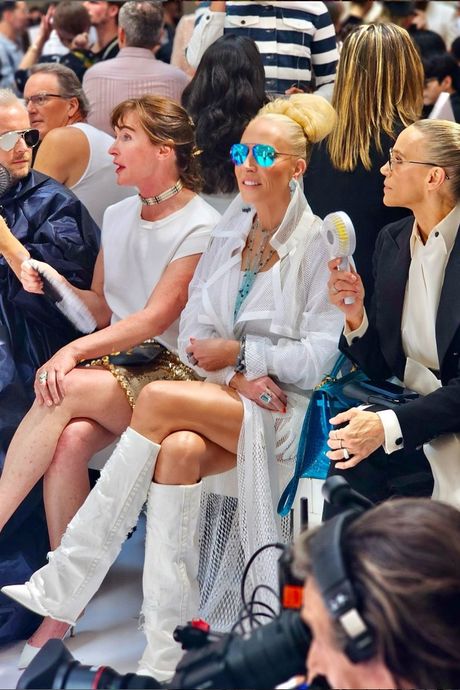
… With Marco De Vincenzo, creative director of Etro, in April 2024 … And at the Jean Paul Gaultier haute couture show at Paris Fashion Week in June 2024. Photo: Courtesy of Suzanne Saperstein.
… With Marco De Vincenzo, creative director of Etro, in April 2024 … And at the Jean Paul Gaultier haute couture show at Paris Fashion Week in June 20…
… With Marco De Vincenzo, creative director of Etro, in April 2024 … And at the Jean Paul Gaultier haute couture show at Paris Fashion Week in June 2024. Photo: Courtesy of Suzanne Saperstein.
As long as there have been fashion shows, there have been preferred clients in the front row. Just not nearly as many of them. Suzanne Saperstein has been a fixture of the front rows in Paris since the 1990s, save for a few years she missed during her divorce from Texas billionaire David Saperstein in the mid-aughts. “I’m sort of a relic on the scene,” she says, describing a different era when she was one of a handful of clients at the shows and designers like Gianfranco Ferré and Jean Paul Gaultier became her friends. To preserve the condition of her extensive couture collection, her pieces are rotated every two years between the closets of her homes in Houston and Los Angeles and temperature-controlled storage rooms. (Curators from LACMA advised her on the system.) But Saperstein says it’s harder to build relationships with designers today: “They just have so many clients, and so many things to do, that they don’t really get involved as much.”
How can they? The $400 billion global luxury-goods market has more than doubled in size since 2010. Today, almost everyone can buy a taste of it, even if they’re just splurging on a $60 designer lipstick or spending a few hundred dollars on a secondhand logo handbag. Over the past decade, however, fearing overexposure, many luxury houses have focused on releasing limited-edition products or otherwise gatekeeping their most coveted styles and designs for their most reliable customers.
When the pandemic hit, those top shoppers stopped visiting stores as they once did. So sales associates had to go to them — to their homes and then, as COVID restrictions eased, to private dinners and pop-up stores by the beach. Clients, as it turned out, loved the special attention.
At the same time, luxury brands — seeing unprecedented demand for their products as people, perhaps stuck at home and having little else to spend their money on, put their stimulus checks and unexpected savings to use by buying Gucci North Face puffers and Prada nylon bags — began jacking up their prices. Gucci’s classic leather loafers cost $700 in 2016; now they’re $1,000. The Chanel Flap Bag has doubled in price since 2019 to around $11,000.
The luxury business seemed unstoppable until mid-2023, when those “aspirational shoppers,” who spend under $10,000 a year on high-end labels, started cutting back in the two largest luxury-goods markets: the U.S. and China. The economic situation in China, luxury’s fastest-growing market since the early aughts, has only worsened this year, and, as the recent stock-market unsteadiness in the U.S. has shown, economic sentiment can shift quickly.
This summer, fashion’s three largest conglomerates, LVMH, Kering, and Richemont, reported revenue declines. (In the first half of the year, Kering’s total revenues dropped by 11 percent. LVMH was down by only one percent, but compared with its performance during the same period in recent years — when it grew by 15, 28, and 56 percent — the results were troubling.) Brands that are most popular with the “aspirationals,” like Gucci and Burberry, were hit the hardest.
While the middle classes waffle, luxury brands are turning to their first love, the irredeemably rich, who are now even wealthier. Between 2020 and 2023, the wealth of the top one percent of Americans increased by nearly $15 trillion. So fashion houses are left wondering, What do you offer the people who have everything to get them to buy even more?
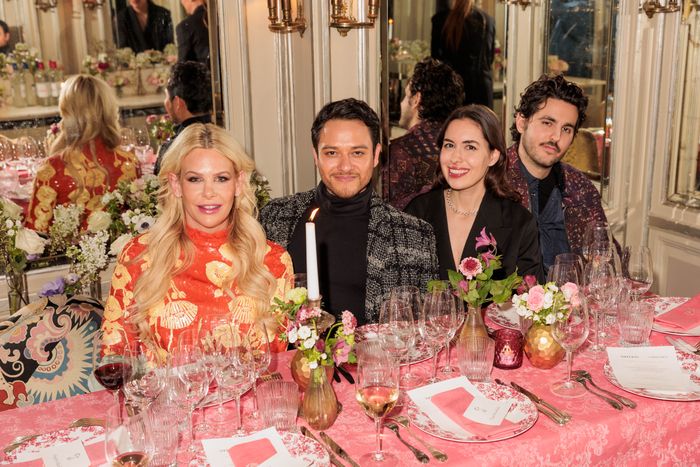
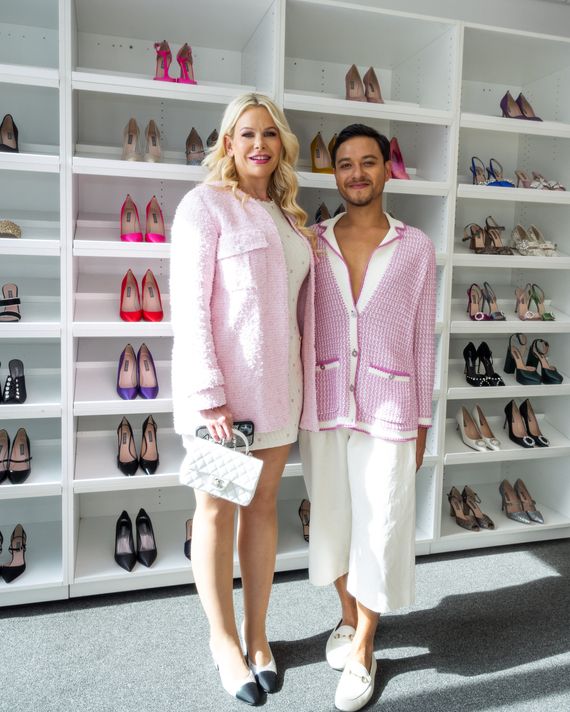
From left: VIC Laura Sachs at a dinner at Lapérouse to celebrate André Leon Talley in Paris in January 2023 … Photo: David Ctorza/BFA.com/Shutterstock/David Ctorza/BFA.com/ShutterstockAt a Vogue100 breakfast celebrating Sarah Jessica Parker and the SJP Collection at the Vogue offices’ fashion closet in New York in April 2023 … Photo: Ryan Sides
From top: VIC Laura Sachs at a dinner at Lapérouse to celebrate André Leon Talley in Paris in January 2023 … Photo: David Ctorza/BFA.com/Shutterstock/…
From top: VIC Laura Sachs at a dinner at Lapérouse to celebrate André Leon Talley in Paris in January 2023 … Photo: David Ctorza/BFA.com/Shutterstock/David Ctorza/BFA.com/ShutterstockAt a Vogue100 breakfast celebrating Sarah Jessica Parker and the SJP Collection at the Vogue offices’ fashion closet in New York in April 2023 … Photo: Ryan Sides
… And at Vogue World in Paris in June 2024.
Photo: Astra Marina/BFA.com/Shutterstock/Astra Marina/BFA.com/Shutterstock
The difference between a VIC and a regular C starts, obviously enough, with how much you spend. But it also matters where you spend it — and on what. Mytheresa or Saks Fifth Avenue will reward its best customers with invites to special events, but then your spending, spread across different designers, might not get noticed by the labels. If you want to be invited to a particular brand’s inner circle, it’s helpful to establish a relationship with a sales associate who can advocate for you. There’s a sliding scale of perks — perhaps it starts with a cocktail party in your city with other loyal customers or options to preorder runway collections. Once a house knows you are a serious enthusiast, it might invite you further in to, say, a one-off domestic runway show.
The more major the label, the harder you may have to compete for its attention. A smaller brand might invite you to meet the designer or seat you at the show if you spend as little as $30,000. But to cement your status in the luxury Establishment — like Chanel, Dior, and Louis Vuitton — “$100K doesn’t do anything anymore,” says an L.A.-based stylist, one of half a dozen sources in and around the VIC world who explained how it typically works. “Now it’s $200K a year,” they say. For many clients, that kind of shopping spree is no big deal. “You can do it one day,” as the VIC salesperson puts it, helpfully. Or even more: “At Louis Vuitton, there’s a lot more clients spending $200K to $300K,” says one New York–based stylist. That is, for Americans; VIC expectations, and rewards, vary by region.
Since the pandemic, another VIC, Lisa Park of Incline Village, Nevada, found herself taking her already healthy interest in shopping up a notch, becoming what she calls a “super-fashionista.” Which means what, exactly? “I guess I started spending more,” she says. Brands took notice and have since bombarded her with invitations to spectacular events. “You don’t want to say ‘no’ because you’re so curious,” Park says. “So I keep saying ‘yes.’” Just this year, luxury labels hosted her in Paris, Milan, Florence, Monaco, St.-Tropez, and the Amalfi Coast. Her Instagram is full of flexy posts from first-class flights; fittings with Fendi, Valentino, and Louis Vuitton; after-parties with designer Pierpaolo Piccioli; breakfasts at the Hôtel Plaza Athénée; and shopping appointments at Dior.
Park tells me about one particularly magical evening Louis Vuitton hosted this past March. The night before the fall 2024 ready-to-wear show, the labels hosted her at a formal dinner at the Abbaye des Vaux-de-Cernay, a sumptuously renovated former Cistercian abbey outside Paris. Dozens of servers in tuxedos lined the entrance of the candle-filled refectory as guests filed in. “It’s like in the movies,” Park says. “They have a high budget and spend a lot of money to hold these events. And obviously they’re extraordinarily beautiful and fun.” Park wore a black leather bustier and a sheer long skirt with a blue striped underlayer, both from Louis Vuitton’s spring 2024 collection, topped with an oversize diamond-encrusted lariat necklace.
For many VICs, these trips are a chance to actually wear the wonderful, exotic things in their closets — and to maybe show off a little on Instagram. Scroll through red-carpet pictures far enough and you’ll find a urological surgeon from Ohio who lives a double life in designer gowns. A dentist’s wife who takes prayer requests on her personal website. A Hidden Hills attorney who heads to Paris at least twice a year. A bicoastal Reiki master who treats her Instagram feed like a full-time job. Much to the distress of the usually liberal fashion workers, many VICs are Trump supporters. “The ones that I suspect — I don’t know for sure, and I kind of want to keep it that way,” says the salesperson of his clients’ political views.
Ahead of a runway show, the sales associate says their clients typically spend around $60,000 buying new outfits for a few days of events in Paris or Milan. Only the trendiest pieces from the latest collections will do, usually preordered days after the most recent collections debut. The point is to wear something nobody else has while nailing the latest trends. Sales associates will hold back certain coveted items for their preferred shoppers. Like Alaïa’s popular mesh flats, which these women bought over a year ago and now own in six different versions, or The Row’s jelly sandals. Their handbag is always a Birkin or the Lady Dior. Maybe a new Bottega or Loewe.
“These women show up in $3 million necklaces at a 10 a.m. fashion show — it’s fabulous,” says the New York stylist. Quiet luxury, a recently popularized term for a Wasp-coded, low-key, logo-free approach to dressing, isn’t interesting to today’s front-row VIC set — at least outside the office. (If they go to an office.) “It’s not youthful,” one veteran stylist tells me. “There’s no sex appeal in it; there’s no glamour in it. There’s no currency in that communication.”
And this market’s make-a-splash tastes matter. Chanel has fallen out of favor among many of the VICs since Karl Lagerfeld died in 2019 and his longtime deputy, Virginie Viard, took over — competently but without much sparkle. “None of my clients have purchased Chanel since Virginie,” says the New York–based stylist. “It’s just not interesting to most people.”
Although Chanel’s overall sales remain high — reaching $20 billion in 2023 — Viard was forced out in June. Until her successor is named, some clients are wary of buying. Former Valentino designer Piccioli has many loyal American clients who would love to see him at Chanel.
Others are rooting for Daniel Roseberry. His provocative and surrealist Schiaparelli drives the VIC set wild. “It’s bolder and more unique than most other brands,” says Nolan Meader, an image consultant and stylist. The majority of his clients are VICs.
In the U.S., Schiaparelli’s collections are available only through Bergdorf Goodman in New York and Neiman Marcus in Dallas and Beverly Hills, adding to the appeal. “What my clients, at least, were telling me is ‘I don’t buy Chanel ready-to-wear anymore; I’m going to buy Schiaparelli,’” says Thibault Brière Descors, a Paris-based stylist and VIC consultant.
Clockwise from left: VIC Lisa Sher-Chambers at Thom Browne’s fall ready-to-wear show in New York in February 2024 … Photo: Yvonne Tnt/BFA.com/Yvonne Tnt/BFA.comAt a Schiaparelli by Daniel Roseberry event hosted by Bergdorf Goodman in New York in May 2024 … Photo: Sansho Scott/BFA.com/Sansho Scott/BFA.comAnd at a Mugler dinner party hosted by Vogue100 in Paris in June 2024. Photo: Daria Senin
From top: VIC Lisa Sher-Chambers at Thom Browne’s fall ready-to-wear show in New York in February 2024 … Photo: Yvonne Tnt/BFA.com/Yvonne Tnt/BFA.comA…
From top: VIC Lisa Sher-Chambers at Thom Browne’s fall ready-to-wear show in New York in February 2024 … Photo: Yvonne Tnt/BFA.com/Yvonne Tnt/BFA.comAnd at a Mugler dinner party hosted by Vogue100 in Paris in June 2024. Photo: Daria SeninAt a Schiaparelli by Daniel Roseberry event hosted by Bergdorf Goodman in New York in May 2024 … Photo: Sansho Scott/BFA.com/Sansho Scott/BFA.com
A paradox of the VIC world is that no matter how much you spend, you can sometimes still be treated high-handedly. It is rare, but it happens: This is fashion, after all, and there is sometimes a feeling that just because someone can afford to buy it, it doesn’t mean they know how to wear it. “The customer driving global luxury is quite tacky in a lot of cases, and no one really admits it,” says a fashion investor.
Brands can’t completely control what clients look like or what they wear. But it’s clear they are watching and judging. Whenever she goes to a fashion event, Park wears the host label “from top to toe,” she says. “That, in my opinion, is etiquette.”
Not everybody is so astute. “Everyone is trying to upstage each other. We try to make sure they don’t go too over the top,” says the sales associate, who remembered when a VIC arrived at a runway show wearing a competitor’s logo. “Everybody talked about it. We couldn’t get her to change her mind — she didn’t give a fuck.”
The VIC sales associate told me about the time a creative director asked that a front-row client not be invited back to the runway show. “She overdid the makeup; the ponytail was too high,” says the salesperson. On top of that, “this was before Ozempic, so she was a little heavier.” It didn’t matter that the client had spent nearly a million dollars shopping at the brand; the designer felt it wasn’t worth the damage she was doing to its image at its most visible seasonal event. (The client took her business elsewhere.)
“Having money isn’t enough anymore. You have to embody what the brand wants people to see,” says Meader.
A client’s social-media behavior can also undermine their chances of landing coveted invites. “I’ll tell them, ‘If you keep posting shit like this, you’re never coming to a show,’” says the anonymous New York stylist of his newbie clients, referring to posts that are “too logo everything. Too Look, look, look at me — if it looks too manufactured.” Taking selfies with celebrities is also a big no-no, though it does happen. Clients can also draw side-eye if they take too many photos and videos during shows or parties. (And they can never share pictures taken inside the Chanel-couture atelier.)
Several sources say the Italian brands, especially the ones still controlled by their top designers, like Armani and Dolce & Gabbana, are the best at high-end-clientele–ing. “Nobody does it better than the Italians — they understand what it feels like to create a community,” says Meader. Alta Moda, Dolce’s multiday destination couture show, is among the most coveted invites in the VIC world. July’s edition, on the coast of Sardinia, opened with a performance by Christina Aguilera and closed with one by Katy Perry. Each night was an opportunity to wear an elaborate Dolce gown. One evening was exclusively dedicated to the brand’s pricey new jewelry collection. The fashion-industry investor tells me Alta Moda appeals because it is less stuck-up than some of the high-profile French events and clients can more easily mix in with celebrity and influencer guests. Usually, at a fashion show, the editors sit together in one area, the celebrities in another, and the clients in another. But at Alta Moda, everyone can mix. “You’re mingling with Bryanboy,” he says.
Like any elite pursuit with social signaling at its core, the VIC lifestyle requires not just money but tremendous time and, increasingly, expert assistance.
Kristin Dodson Smith, a Los Angeles–based stylist, says that many of her clients view their status as front-row shoppers as “a job or an extreme hobby.” She uses a client of hers who loves Valentino as an example. After each ready-to-wear show, they visit the showroom. Together, they choose what she’ll wear to the next show and what she’ll wear to parties and fund-raisers in the months ahead. Then the clothing arrives back home in Dallas or Miami and Dodson Smith oversees fittings and tailoring. “It is very task-oriented, and a lot of the women who look at it like that are very social,” she says.
And then there’s Vogue100, Wintour’s $100,000-a-year membership club, launched in 2019 as a somewhat brazen way for the magazine to sell access to her and everything she represents. Would women pay to have breakfast with Wintour, especially if they could brag about it on Instagram? The answer was a resounding “yes.” Initially, Vogue100 had more of a professional angle, targeting rich women with a start-up or jewelry line looking to build their businesses and make them the next Lauren Santo Domingo, a socialite turned entrepreneur. But coming out of the pandemic, Vogue100’s appeal has become its access to a pre-built social calendar.
Sachs became acquainted with Vogue100 three years ago through Dodson Smith at a New York luncheon for top clients hosted by Net-a-Porter. Dodson Smith encouraged her to stop by a cocktail party Vogue100 was hosting with Dolce & Gabbana in Milan a few weeks later. (Sachs was already going to be there to see Matthieu Blazy’s first runway show for Bottega Veneta.) Sachs says that after that event, accepting the offer to join Wintour’s club was a no-brainer. “The energy is super-high, and everyone’s so happy because everyone loves the art of the fashion and what they’re seeing,” she says.
Her favorite Vogue100 event was a breakfast inside the famous Vogue fashion closet at One World Trade Center in New York. Sachs wore a tweed Chanel jacket and matching dress with the brand’s signature cap-toed slingback shoes covered in pink sequins. Sarah Jessica Parker was the guest of honor and mingled with the members as they looked at her line of colorful heels before she stepped onto a makeshift stage to chat with Vogue’s then–accessories director Willow Lindley. Then they all sat down together for a breakfast of avocado toast. “It was just super-hands-on, super-intimate, and an experience I won’t forget,” says Sachs.
Many of Vogue100’s events are photographed and covered on vogue.com, adding to the appeal for members who want to boost their public profiles. (Their selfies with Wintour, however, stay on Instagram, where #Vogue100 is a popular tag in their bios.) And for those members with jewelry lines or fashion-tech start-ups, there is the possibility of editorial coverage. Still, some members have groused that it isn’t a guaranteed source for runway-show tickets — you usually need to be a VIC for the individual brand for that. Conveniently, Vogue stages its own annual runway show now, Vogue World, albeit one that is open to the public.
At the most recent edition, outside at Place Vendôme at the start of Paris Couture Week, prices went as high as nearly $27,000 for a “front-row experience” that included access to the red carpet and the after-party. Another option, for nearly $11,000, included an invitation to an “editorial breakfast” the morning of the show. Otherwise, prices for second- or third-row seats started at $2,100. Vogue100 members were well represented in the audience. Before the show began, Vogue and Eva Longoria hosted a cocktail party next door at the Hôtel d’Évreux.
For Lisa Sher-Chambers, the events in Paris marked her first time as a Vogue100 member. She exchanged numbers with many of the women she met, eager to expand her fashion network after leaving her career in investor relations last year. She shops mostly through Bergdorf Goodman and Mytheresa, which invited her to her first fashion events in New York in 2021. She’s also pursuing a career as a stylist.
This month, Sher-Chambers is taking on an ambitious runway schedule, attending shows in New York, London, and Paris. Her favorite designer at the moment might be Schiaparelli, which recently began inviting her to events with fellow devoted fans. (To Vogue World, she wore a bright-blue draped Schiaparelli top and matching skirt.) “We’re all groupies, kind of, which is fun in a great way,” she says.
Not everyone, though, wants to be a groupie forever. Park admits the travel schedule is starting to wear on her. “It’s super-exciting but, at the same time, exhausting,” she says, predicting she will limit herself to only a few events a year soon, perhaps in a couple of years. “And, you know, your closet is just jammed. You have to think about that, too.”

